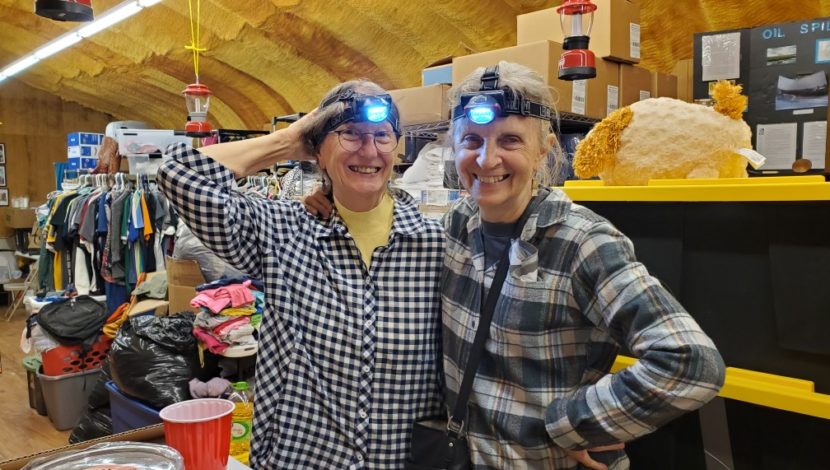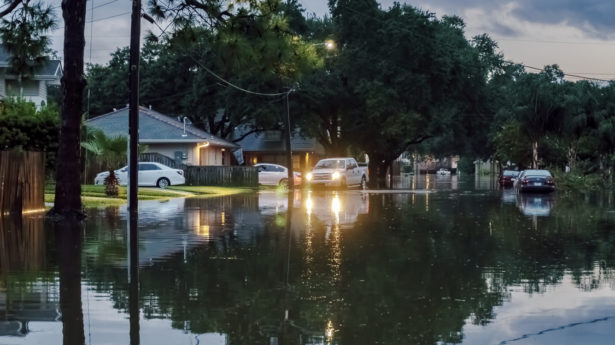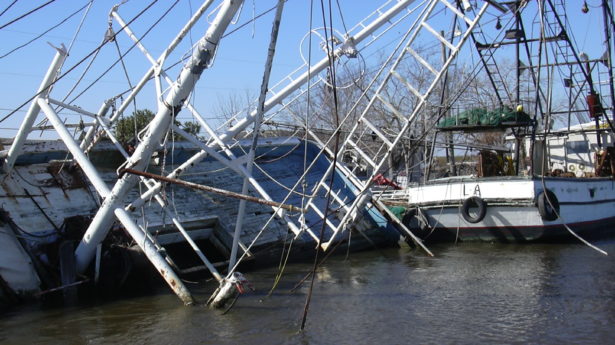The Unitarian Universalist Service Committee advances human rights through grassroots collaborations.
“Inspiration in the Toughest of Times:” The Lowlander Center

By UUSC Staff on December 1, 2021
UUSC partner, the Lowlander Center, plays a pivotal role in its work with Native Tribes in southern Louisiana. UUSC interviewed Kristina Peterson, a facilitator at Lowlander, about the work the organization does and what keeps the Center advocating for justice for local Tribes in the face of climate change and environmental racism.
Tell us about your organization, Lowlander Center. The center was birthed from the collaboration of 15 Louisiana delta communities who wanted to learn more about each other and to problem solve shared issues. Six months after the communities gathered together, their newly formed relationship was solidified through their common exposure to and experiences of the BP oil disaster in the spring of 2010. Collaborating between the Louisiana communities was immediately expanded to the building of relationships with the Valdez ‘oiled’ communities of Alaska. The model of participatory problem solving, collaboration, and partnerships became core to Lowlander’s work. Lowlander is an organic, non-hierarchal organization, sometimes described as an “adhocracy,” with various working groups and team members. The model is egalitarian with all participants as equals, thus it has no staff, but rather a facilitator.
What are Lowlander Center’s biggest priorities? The biggest priority for our work is to have as much agency-capacity within each community, utilizing the assets of the people to vision and problem solve, especially as it relates to the continuation and enhancement of Tribal and historied communities’ lifeways. The peoples of the region are in a sacrificial zone of extraction, pollution and massive land loss due both to climate, development, and historical colonial processes. Work being done has to address multiple layers of impacts from disasters, including climate and pandemics. The proactive work we do includes ways to address adaptation and forced movement of the human and non-human family. The work includes procuring and sharing knowledge/wisdom and resources. Through our shared work, we gain strength, hope, and imagination for our collaborative work. This imagination and hope enables Tribes to address climate and land loss impacts in a variety of way including the backfilling of canals and the damage created by oil and gas companies.
How is Lowlander Center working to support local tribes in the wake of Hurricane Ida and other storms? We are working together on immediate needs following Ida and other storm events with life supporting measures—from resources for evacuation to currently planning for temporary housing and permanent long-term resilient-safe housing solutions. The work occurs on multiple levels and we provide direct assistance, advocate for resources and policies, and we work to keep the public aware of the critical needs of the region through media and other sources. An important element of the work is to take the issues created by the storms in 2020 that devastated the western part of the state and link them to the responses in the southeast region of Louisiana.
How can UUSC’s members best support the work your organization and allies do? UUSC members can support the work of the region in multiple ways:
- Understand the vulnerability of the Delta region—it’s the fastest disappearing delta in the world!
- It can be “boots on the ground” work or other types of resourcing, coordinating, grant writing with the Tribes or Lowlander, or making phone calls.
- Learn about the history and current work of the region’s Tribal Nations.
- Partner with us on a project that is of interest to your congregation.
- Help support state and federal legislative measures pertinent to our work.
What are the biggest challenges Lowlander Center faces in this work? As this region is experiencing the layers of structural violence brought on by systemic racist policies and practices, it is coupled with the impacts of massive land loss, climate-induced violent weather events, and various types of health-related illnesses from toxins and pollutants. It is difficult to continue to be pro-active on projects when the Lowlander team is also responding to the current crisis with limited resources.
What inspires you in this work? The faith and resolve of the people involved with our Lowlander family and the commitment for making the region/world better for future generations is the inspiration. It is inspiring to learn with our partners around the world and stand together, sharing and caring for each other in similar circumstances—we are not alone, we are family. The love of our family—human and non. With God, we find inspiration in the toughest of times.
Photo Credit: The Lowlander Center

